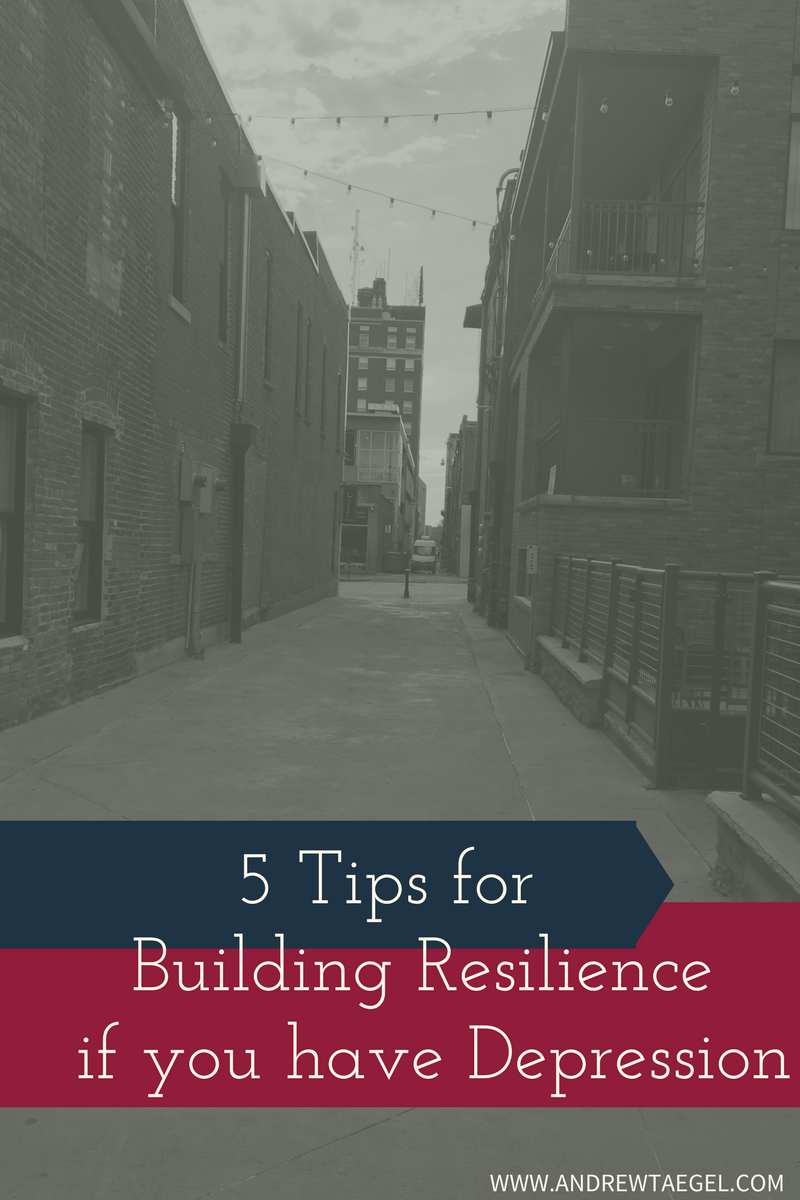|
Depression at it’s worst can look like giving up again and again. When things get challenging the depressed mind can magnify that struggle and determine “it will always be this bad” or decide the requirements of living are “too much.” As much as a depressed person may want to get out of bed in the morning, remaining under the covers hidden from the rest of the world may be the choice they make again and again.
How do you know if you’re experiencing depression? Here are a few of the ways depression can manifest itself.
fears, self-doubt, and discomfort are all involved in the process of trying something new or pursuing something meaningful in life. In short, if we set out to drive toward a meaningful destination these are the passengers we will take with us on the bus.
A common misconception about internal struggles The common misconception is that conquering or vanquishing the self-doubt, fear, and discomfort has to come before we are able to move toward what we value, when actually the closer we get to things we value, the louder these passengers tend to become and the more we experience self-doubt, fear, and discomfort. With this understanding it might make sense to employ another strategy; to learn to have these feelings, as challenging as they truly are to have, so they don’t take control or determine where we ultimately end up. Learning to have these unpleasant feelings without allowing them to dictate where you go and what you do is what I mean by resiliency. The more we can tolerate the things that show up internally and cause us discomfort or distress, the less they get to dictate our behavior. So how do we increase our resiliency? Here are a few tips to begin to practice the skills necessary to incorporate more resilience in the face of depression. 1. Clarify the “what” and the “why” behind goals you set. It’s very common to set out toward a particular goal and emphasize figuring out the specific ways you might achieve it, the “how.” While planning is important and valuable, connecting goals with values - the reasons “why” you are pursuing a particular goal - can solidify your motivation and give you purpose during the inevitable moments when you struggle or hit a setback. The truth is none of us are perfect as much as we may aspire to be, but if we behave in service of our values the outcome tends to matter less than finding the right motivation behind what we do. Take a moment to ask yourself what you’d like to accomplish? Ask yourself why accomplishing this goal is important to you personally? What values do you connect with pursuing this goal?
and wish to begin dating you are guaranteed to meet with the discomfort and downright pain of rejection. They’re part of the deal. Choosing to avoid discomfort often comes at the price of not pursuing the things that matter (like relationships). The good news is the more often we practice feeling uncomfortable the better we get at it and the easier it is to do the challenging things.
You can practice feeling uncomfortable at any time, but a trained mental health professional can provide guidance on how to practice this in effective ways. One of the things Acceptance and Commitment Therapy (ACT) does well is assist you in feeling better not feeling better, meaning we build skills that allow us to feel discomfort and tune in rather than needing to run away or force out what we may find unpleasant.
3. Make a list and set a deadline.
Another tip for building resiliency is getting used to accomplishing goals you set for yourself regardless of what may come up along the way. While we cannot always reach the goals we set for ourselves in exactly the ways we would like or in the exact timeframe we wish to accomplish them, practicing setting deadlines and striving to achieve a set goal can be a way to learn habits and skills you wouldn’t otherwise have the experience to foster. As you continue toward a specific goal with a timeline in mind and strive to get things accomplished you learn how to override what the mind is saying to you about your limits or inabilities. You are also putting the emphasis on doing something instead of staying stuck arguing with your mind and not getting anything done. If you can remember a time when you had a tough deadline experience but pushed through the obstacles in order to accomplish a task, moments like those can teach us we are capable of withstanding much more than we give ourselves credit for and they can remind us of what is possible when we don’t give up. Take a moment to think about a time you achieved something despite a worrisome deadline; note how you were able to achieve the goal despite the pressure. Notice if it was possible to let go of some desires to be perfect in order to get the job done. Is there anything you’d like to accomplish in the near future that you could realistically set a deadline for? Is there anyone you can tell about your deadline to establish some accountability?
does bring up our personal failures and struggles all the time, it selectively likes to leave out all the things we should be proud of.
Making a list of past accomplishments and intentionally reminding yourself of what you’ve done well is not only healthy but can lead to inspiration as you remember the strategies employed in your past successes or the circumstances that led you to strive to achieve. If you’re struggling to get started with something, you might be surprised how helpful brainstorming past successes and accomplishments can be. Take a moment to list a past accomplishment and notice all you can about the success. What did you have to overcome to accomplish your goals? What does it mean to be a person who accomplished this goal? How would you feel about a person who accomplished a similar goal? How might you encourage them to continue moving forward? Can you provide similar encouragement to yourself? 5. Seek support from others. You may not necessarily associate this tip with resiliency, but those who can lean on others during challenging times tend to withstand the challenges much better. A healthy, active support system can provide strength, encouragement, and insight when facing hardships and can provide you with the opportunity to assist others when they may be experiencing tough times as well. In fact, social connection and support has been scientifically proven to extend our lives. This may take some creativity if you have been living in isolation for a while or are wondering where to start in building a support system. It may be you already have some key pieces in place and just need to reach out to them on a regular basis. You might be able to find support groups or groups consisting of those with shared interests to begin your search for supportive people to include in your life. There may be family members that tend to encourage and support you or inspire you to think more expansively about things. The good news is there are many options and even a few close supports can be incredibly helpful. Quality can trump quantity when you’re constructing your support network. Take a moment to think about the people who inspire you. What sorts of things do you admire about these people? What qualities do you appreciate? How can you embody these characteristics in your interaction with others? Where might you go to meet new people and connect in meaningful ways? Who can you reach out to today who has been supportive in the past that you already know? You can start reclaiming your life today Dealing with depression is challenging; getting started is often the most difficult part. Even if you're suffering from depression in significant ways, utilizing some or all of these simple tips can put you on the path toward building resilience in your life. For more on ways to cope with depression, check out my blog post about 5 Things to Understand if You’re Dealing with Depression. For additional support check out the workbook: The Mindfulness and Acceptance Workbook for Depression: Using Acceptance and Commitment Therapy to Move Through Depression and Create a Life Worth Living.
Please note: some of the links on this page are affiliate links. This means that if you click on them and purchase through my unique link, I'll receive a small commission at no additional cost to you.
0 Comments
As a therapist I see many individuals dealing with depression. Feeling overwhelmed, fed up, or hopeless are all common experiences and while others can’t see depression externally, it is felt intensely by those who are in the midst of it's grasp and can have profound effects on behavior. At it’s worst it can feel like an enormous boulder on top of someone who has all the desire and reasons for moving forward in life, but can’t because of the weight.
What ensues naturally without some sort of professional intervention tends to be an energy sapping fight with depressive symptoms with attempts to reclaim life coming in short bursts, but ultimately turning into discouragement and exhaustion when long-term changes aren’t accomplished. The reality of long-term change is it takes a while and often comes from a steady, consistent effort over a period of time. Unfortunately a depressed individual can lose the drive to keep moving forward at that slow and steady pace, and when results take time it’s common to quit “before the miracle happens” so to speak. If you find yourself or someone you care about stuck in a similar dilemma, trying to find motivation and meaning in life, while feeling hopeless and lost, here are 5 tips to keep in mind along with a few strategies to try: 1. Thoughts are just thoughts and not the truth of things: One of the more challenging things about feeling depressed is thoughts can be bombarding and feel heavy, which can lead to less action. The more you hear a message “there’s no point,” or “things won’t work out anyway” the more influence those thoughts can have on your ability to engage with your life. Thoughts can feel very true and important, especially the bullying ones, but shifting to a stance of seeing thoughts as simply thoughts and not the truth of things can be extremely effective in defusing from the intensity of the thought and freeing up energy to do other things. Working with a trained mental health professional on mindfulness skills can assist in this process.
2. It’s possible to live from the feet up instead of the head down: This can be a radical idea for those dealing with any mental health concern and can be very beneficial for those trapped under the “depression boulder.” Often times when our thoughts show up and bully us around telling us "we can’t do something" or "we won’t succeed even if we try," the impulse can be to resolve those thoughts and the unpleasant feelings that come along for the ride before we take action. The secret here is you don’t have to feel better to take action. A “feet up” stance to living turns things on their head (pun intended) and prioritizes the movement forward over wrestling with the slippery slope of the depressive mind.
3. Action may need to come before you feel better: This next tip is crucial to recovery from depressive disorders. Taking action has been shown to be the most effective treatment for depression and it can be one of the most difficult thing as well. Sitting in the depths of depression it can be common to fantasize, “If I only felt better I could pursue the life I want,” or “If things would only work out and I got a break, I’d feel so much better.” These thoughts can be dangerous in their impact on behavior because it puts the necessity on resolving feelings before action is possible. Keeping in mind that action is the most effective medicine, finding ways to view your circumstances in a way that places action as the priority can be healthier and lead to more positive outcomes for the depressed individual. Understanding that action will have to take place before you feel better can be a huge insight when looking for solutions. Linking your own purpose to action can be helpful as well. Knowing why you might pursue something and what values pursuing a goal may be in line with for you personally can assist in moving forward even when you aren’t feeling “better” or when things are downright unpleasant.
4. Searching for the positive takes more work: From an evolutionary standpoint we are built to notice the negative far more than the positive. It’s what kept our ancestors alive. The ability to scan an environment and decipher all the potential threats and hardships was incredibly effective in the wilderness or in early tribal communities. Add to this predisposition the depressed perspective and things can seem downright bleak almost all the time. The glasses worn by depressed individuals tint the whole world in the depressed shades of hopelessness and mediocrity. When this is your reality it seems like the negative thoughts, feelings, and reminders are everywhere around you. When you do contact something uplifting, or take action that you can be proud of, the negative mind looking through the depression tinted glasses often won’t see the good or will discredit it in favor of what seems much more important or relevant, the negative thoughts.
5. Addressing the “bad” feelings requires less work, not more: Here is where we get into the paradox of depression treatment. In our culture it’s common to value fighting against or battling something unwanted. We combat obesity, there’s a war on drugs, and we fight cancer just to name few examples. With mental health disorders, the battle is often the problem or at least amplifies the distress. If you are busy battling against or arguing with your depression you are basically caught in a tug of war with the disorder, one that may feel rewarding as you use your strength to pull against what’s on the other end of the rope attempting to pull you in, but ultimately this strategy keeps you standing in place, digging in, and using all your energy and effort to fight with depression. Meanwhile you’re no closer to living life or doing the things that actually assist in helping like taking action (see point 3). What if you did less and dropped the rope? Instead of using all your effort to fight with depression or the depressed thoughts, you simply noticed they were there and went on about your life, maybe taking the action you choose. In Acceptance and Commitment Therapy or ACT the strategies utilized involve letting go of struggle and using energy instead to move in a valued direction in your life that connects you with the things you find meaningful and care about.
For more on depression check out: 5 Tips for Building Resilience, if you have Depression. *To learn more about ACT you may want to check out “Get Out of Your Mind and Into Your Life” by Steven C. Hayes, a workbook designed to get unstuck and start moving toward a more meaningful life in the face of challenging mental health disorders such as depression and anxiety. Andrew Taegel is a provisionally licensed professional counselor and has extensive training in Acceptance and Commitment Therapy (ACT) and Mindfulness Based Psychological Interventions. Andrew has a private practice in Columbia, MO offering counseling for anxiety, depression, and grief concerns. He is the president of the Missouri chapter of the Association for Contextual Behavioral Sciences, and facilitates a local Acceptance and Commitment Therapy peer consult group. Andrew also specializes in men’s grief work and assists those going through the many losses involved in divorce. To learn more about Andrew visit: www.andrewtaegel.com
Please note: some of the links on this page are affiliate links. This means that if you click on them and purchase through my unique link, I'll receive a small commission at no additional cost to you.
|
AuthorI am a therapist in private practice working to assist those struggling with self-doubt, guilt/shame, addiction, anxiety, depression, and grief to decreasing the struggle with internal distress and commit to actions that move them closer to the things they value most. Archives
September 2020
Categories
All
|



 RSS Feed
RSS Feed